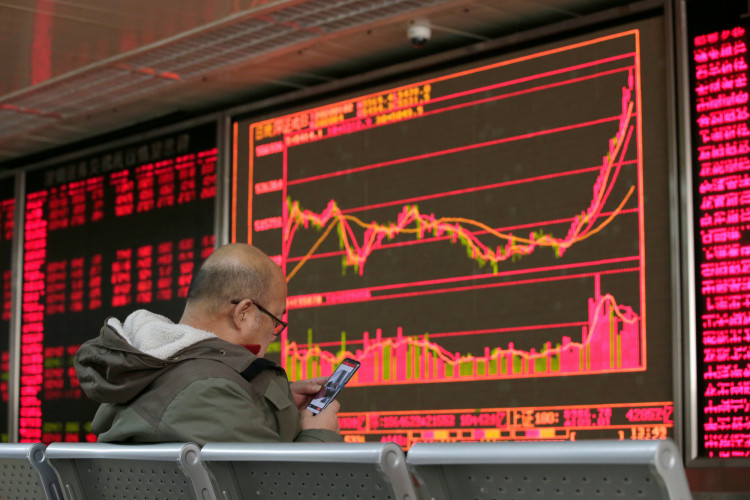Chinese stocks experienced their most significant single-day rally in 16 years on Monday, with domestic A-shares hitting an all-time high turnover. This came as investors rushed to capitalize on Beijing's latest wave of aggressive stimulus measures aimed at reviving a sluggish economy. The stimulus, which includes substantial rate cuts and fiscal support, has lit a fire under Chinese equities, pushing the CSI300 blue-chip index to an 8.5% gain at the close, marking a 25% surge in just five days.
The broader Shanghai Composite Index also saw significant gains, closing up 8.1%, with a total turnover of 1.17 trillion yuan ($166.84 billion). This extraordinary rally is the strongest since 2008 for both indices. Meanwhile, the Shenzhen index surged by 11%, recording a turnover of 1.4 trillion yuan.
The surge follows the People's Bank of China (PBOC) unveiling a series of stimulus measures last week. Among the most impactful moves were new tools that provide funds, insurers, and brokers with easier access to capital, allowing them to buy stocks. These measures, designed to stabilize the country's ailing economy, have driven investors-both local and foreign-back into the market.
"It's really a big turnaround; the policies are so intensive," said Dickie Wong, executive director of research at Kingston Securities. "We have never seen such clear instruction to stop housing prices from declining and support the stock market."
This wave of optimism pushed the Hang Seng Index in Hong Kong up by 2.4%, with property stocks rallying. The Hang Seng Mainland Properties Index soared 6.4%, while mainland-listed property stocks advanced 8.2%. The latest support for the property market included measures such as slashing mortgage rates on existing home loans and lifting purchase restrictions in major cities like Guangzhou, Shanghai, and Shenzhen.
Investor enthusiasm was further buoyed by news on Sunday that China's central bank instructed banks to lower mortgage rates for existing home loans before October 31. This move is expected to provide relief to the country's beleaguered real estate sector, which has been a significant drag on economic growth in recent months.
The rapid rally in Chinese stocks reflects an optimistic view that the government's measures could help revive domestic consumption. Consumer staples stocks surged 8.8%, posting their biggest daily percentage gain in 16 years, as investors became more confident in China's recovery prospects. The CSI300 index posted a 21% gain for the month of September, marking its best performance since December 2014. The Shanghai Composite Index, meanwhile, ended September with a 17% increase, its strongest monthly gain since April 2015.
For the Hang Seng Index, the month of September was also notable, with the index rising 17%, its best performance since November 2022. Last week, the Hang Seng recorded its most significant weekly rise since 1998 and the fifth-largest in the past 50 years.
China's financial markets will now close for the National Day holiday from October 1 to October 7, giving investors a brief respite following the frenetic pace of trading. Analysts expect the stimulus-driven rally to continue after the holiday break, as the government remains committed to supporting economic growth and addressing challenges in key sectors like real estate.
In contrast to China's surging markets, other global markets experienced mixed performance. U.S. stocks remained near record levels, with the S&P 500 virtually flat after six winning weeks in the past seven. The Dow Jones Industrial Average dipped slightly, while the Nasdaq composite was up 0.2%. Wall Street's performance continues to be driven by optimism that the U.S. economy can sustain growth even as the Federal Reserve cuts interest rates.
In Asia, however, markets were pulled in opposite directions. Japan's Nikkei 225 dropped 4.8%, driven by concerns that the incoming prime minister, Shigeru Ishiba, would support higher interest rates, a policy shift that could hurt profits for Japanese exporters. Stocks of major companies like Toyota and Honda plunged by 7.6% and 7%, respectively, as investors reacted to the prospect of higher borrowing costs and a stronger yen.
Meanwhile, European carmakers like Stellantis and Aston Martin also faced steep declines. Stellantis tumbled 13.7% after cutting its profit forecast for the upcoming year, citing growing competition from Chinese automakers and the need to invest heavily in its U.S. operations. Aston Martin, similarly, saw its stock drop sharply due to supply chain disruptions and macroeconomic challenges in China.
Back in China, the rapid surge in stock prices has raised questions about the sustainability of the rally. Some market observers caution that while the stimulus measures are likely to provide short-term relief, deeper structural reforms may be needed to ensure long-term economic stability.
For now, however, investors are seizing the opportunity. "Many foreign investors are afraid of missing out," said Wong. "Local retail investors are asking me what they should add to, and institutional investors are rushing to the market to catch up."






